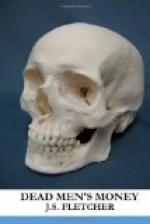“I’m thinking we’ve got on the right clue at last, as regards the murder of yon man Phillips,” announced Chisholm, with an air of satisfaction. “And if it is the right clue, as it seems to be, Mr. Lindsey, there’ll be no great mystery in the matter, after all. Just a plain case of murder for the sake of robbery—that’s it!”
“What’s your clue?” asked Mr. Lindsey quietly.
“Well,” answered Chisholm, with a sort of sly wink, “you’ll understand, Mr. Lindsey, that we haven’t been doing nothing these last few days, since yon inquest on Phillips, you know. As a matter of fact, we’ve been making inquiries wherever there seemed a chance of finding anything out. And we’ve found something out—through one of the banks yonder at Peebles.”
He looked at us as if to see if we were impressed; seeing, at any rate, that we were deeply interested, he went on.
“It appears—I’ll tell you the story in order, as it were,” he said—“it appears that about eight months ago the agent of the British Linen Bank at Peebles got a letter from one John Phillips, written from a place called Colon, in Panama—that’s Central America, as you’ll be aware—enclosing a draft for three thousand pounds on the International Banking Corporation of New York. The letter instructed the Peebles agent to collect this sum and to place it in his bank to the writer’s credit. Furthermore, it stated that the money was to be there until Phillips came home to Scotland, in a few months’ time from the date of writing. This, of course, was all done in due course—there was the three thousand pounds in Phillips’s name. There was a bit of correspondence between him at Colon and the bank at Peebles—then, at last, he wrote that he was leaving Panama for Scotland, and would call on the bank soon after his arrival. And on the morning of the day on which he was murdered, Phillips did call at the bank and established his identity, and so on, and he then drew out five hundred pounds of his money—two hundred pounds in gold, and the rest in small notes; and, Mr. Lindsey, he carried that sum away with him in a little handbag that he had with him.”
Mr. Lindsey, who had been listening with great attention, nodded.
“Aye!” he said. “Carried five hundred pounds away with him. Go on, then.”
“Now,” continued Chisholm, evidently very well satisfied with himself for the way he was marshalling his facts, “we—that is, to put it plainly, I myself—have been making more searching inquiries about Cornhill and Coldstream. There’s two of the men at Cornhill station will swear that when Phillips got out of the train there, that evening of the murder, he was carrying a little handbag such as the bank cashier remembers—a small, new, brown leather bag. They’re certain of it—the ticket-collector remembers him putting it under his arm while he searched his pocket for his ticket. And what’s more, the landlord of the inn across the bridge there at Coldstream he remembers the bag, clearly enough, and that Phillips never had his hand off it while he was in his house. And of course, Mr. Lindsey, the probability is that in that bag was the money—just as he had drawn it out of the bank.”




